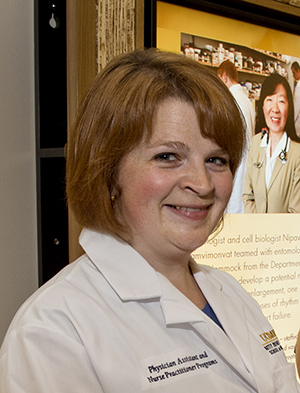Student distinction
Delivering big ideas in primary care to small communities often forgotten

Nurse Practitioner student Sara Marchessault hopes to improve quality of health care in her rural California community.
When Sara Marchessault followed her family from the east coast to Canby, a small, remote community in Northern California with a population of 317, she wanted to continue her career in health care. Marchessault joined the Canby Clinic team as a nurse shortly after arriving in 1997, where one physician, one dentist, a dental hygienist, support staff members and a family nurse practitioner were providing much-needed care in the rural area. That family nurse practitioner who had co-founded the clinic, Virginia Hassler, graduated from UC Davis in 1986 and would ultimately inspire Marchessault’s professional journey and shape her career.
“Virginia helped start the clinic and continues to be a valuable asset to the entire community,” said Marchessault, who is currently pursuing a nurse practitioner master’s degree at the Betty Irene Moore School of Nursing at UC Davis. “She offers a tremendous level of care, builds trust and makes every person she cares for feel comfortable.”
Canby, located in Modoc County roughly 120 miles northeast of Redding, is slightly larger than two square miles and home to only 62 households. For residents, providers at the community’s only health-care clinic offer primary care, dentistry and behavioral care services. Availability to such care appears to be waning because of widespread shortages of primary care providers throughout the country. Researchers at the George Washington University School of Public Health and Health Services reported that less than 25 percent of new physicians are entering the primary care field, while a small fraction, only 4.8 percent, are practicing in rural areas, which creates an opportunity for future nurse practitioners.
The School of Nursing’s master’s-degree program provides a broad education that includes advanced skills in understanding complex problems and generating solutions, how health systems and health care works, how to improve quality, how to lead teams and the business aspects of care. Students, like Marchessault, will ultimately improve the availability of culturally relevant primary care to underserved populations and effectively deliver care as a member of a health-care team. Following Hassler’s guidance, Marchessault decided the nursing school’s mission mirrored her personal vision.
“Although I thought I was done going to school, I decided to take on the challenge,” Marchessault explained. “There are always things when you look around at your world, or your clinic or your team that you want to change. It’s good to learn skills that help you see the change, learn how to propose the change and develop the processes to make change happen.”
While Hassler helped Marchessault hone her skills in the clinical setting in Canby, the School of Nursing presents all students with a dynamic mix of disciplines and approaches that are shaping their growth as a health-care leaders.
“Aside from learning about health care, the school has also taught me leadership and networking, which are so important when you go out in the workforce with other health-care professionals,” Marchessault said. “I’ve developed a lot more confidence since coming here.”
Putting that knowledge to work after she graduates will be an important part of Marchessault’s return to the Canby Clinic, where relationships within the health-care community are critical to providing quality care. Hassler is confident that Marchessault will return from her master’s-degree experience with the necessary skills to help the clinic thrive. She’s so confident that she’s designated Marchessault as her successor when she comes home in 2015.
“This community supported me when I went to UC Davis with the idea that I would return and take care of them,” Hassler said. “Sara came to Canby with a passion for health care and the community. While working for us, she continued her education. We know investing our time and energy in her is well spent and will benefit our community for years to come.”





